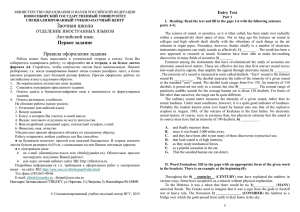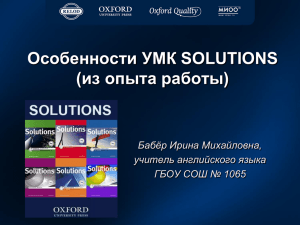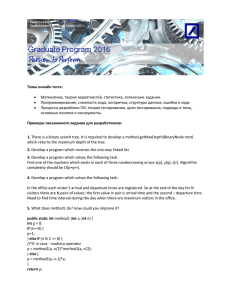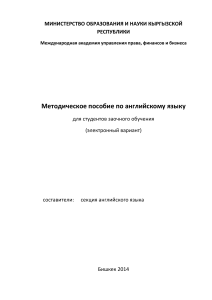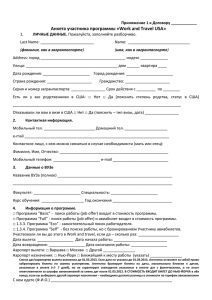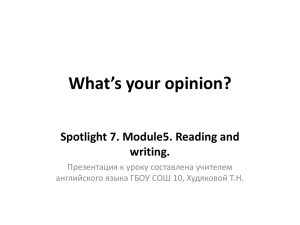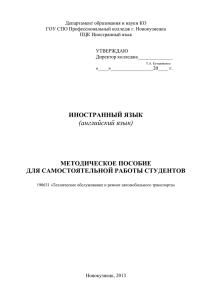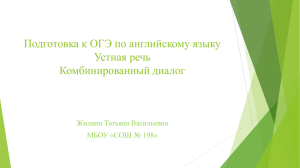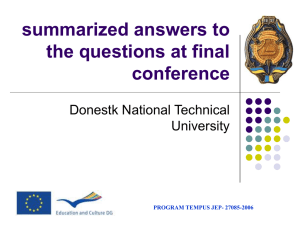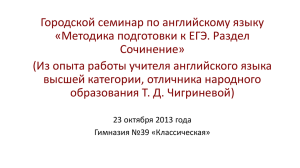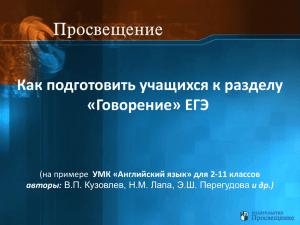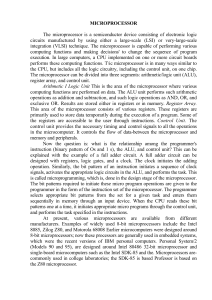Entry Test - СУНЦ НГУ - Новосибирский государственный
реклама
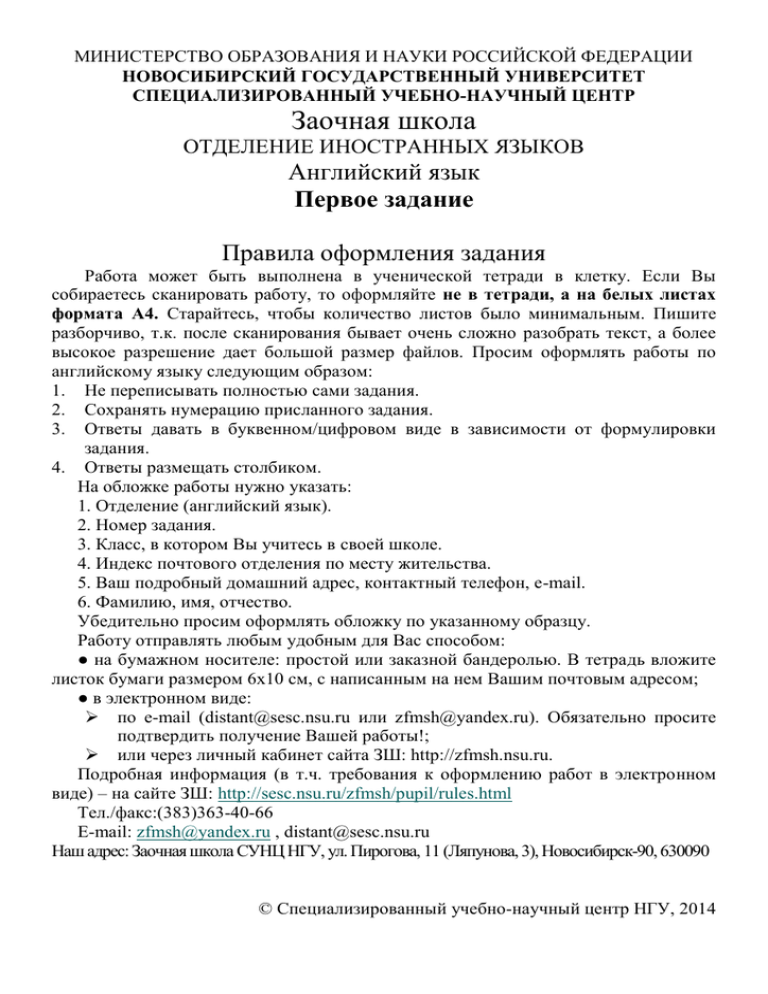
МИНИСТЕРСТВО ОБРАЗОВАНИЯ И НАУКИ РОССИЙСКОЙ ФЕДЕРАЦИИ НОВОСИБИРСКИЙ ГОСУДАРСТВЕННЫЙ УНИВЕРСИТЕТ СПЕЦИАЛИЗИРОВАННЫЙ УЧЕБНО-НАУЧНЫЙ ЦЕНТР Заочная школа ОТДЕЛЕНИЕ ИНОСТРАННЫХ ЯЗЫКОВ Английский язык Первое задание Правила оформления задания Работа может быть выполнена в ученической тетради в клетку. Если Вы собираетесь сканировать работу, то оформляйте не в тетради, а на белых листах формата А4. Старайтесь, чтобы количество листов было минимальным. Пишите разборчиво, т.к. после сканирования бывает очень сложно разобрать текст, а более высокое разрешение дает большой размер файлов. Просим оформлять работы по английскому языку следующим образом: 1. Не переписывать полностью сами задания. 2. Сохранять нумерацию присланного задания. 3. Ответы давать в буквенном/цифровом виде в зависимости от формулировки задания. 4. Ответы размещать столбиком. На обложке работы нужно указать: 1. Отделение (английский язык). 2. Номер задания. 3. Класс, в котором Вы учитесь в своей школе. 4. Индекс почтового отделения по месту жительства. 5. Ваш подробный домашний адрес, контактный телефон, е-mail. 6. Фамилию, имя, отчество. Убедительно просим оформлять обложку по указанному образцу. Работу отправлять любым удобным для Вас способом: ● на бумажном носителе: простой или заказной бандеролью. В тетрадь вложите листок бумаги размером 6х10 см, с написанным на нем Вашим почтовым адресом; ● в электронном виде: по е-mail (distant@sesc.nsu.ru или zfmsh@yandex.ru). Обязательно просите подтвердить получение Вашей работы!; или через личный кабинет сайта ЗШ: http://zfmsh.nsu.ru. Подробная информация (в т.ч. требования к оформлению работ в электронном виде) – на сайте ЗШ: http://sesc.nsu.ru/zfmsh/pupil/rules.html Тел./факс:(383)363-40-66 Е-mail: zfmsh@yandex.ru , distant@sesc.nsu.ru Наш адрес: Заочная школа СУНЦ НГУ, ул. Пирогова, 11 (Ляпунова, 3), Новосибирск-90, 630090 © Специализированный учебно-научный центр НГУ, 2014 Entry Test Part 1 I. Reading: Read the text and fill in the gaps 1-6 with the following sentence parts A-G. The science of sound, or acoustics, as it is often called, has been made over radically within a comparatively short space of time. Not so long ago the lectures on sound in colleges and high schools dealt chiefly with the vibrations of such things as the air columns in organ pipes. Nowadays, however, thanks chiefly to a number of electronic instruments engineers can study sounds as effectively 1) ________ . The result has been a new approach to research in sound. Scientists have been able to make far-reaching discoveries in many fields of acoustics 2) _______ . Foremost among the instruments that have revolutionized the study of acoustics are electronic sound-level meters. These are effective devices that first convert sound waves into weak electric signals, then amplify the signals through electronic means 3) _________ . The intensity of a sound is measured in units called decibels. “Zero” sound is the faintest sound 4) ___________ . The decibel measures the radio of the intensity of a given sound to the standard “zero” sound. The decibel scale ranges from 0 to 130. An intensity of 130 decibels is perceived not only as a sound, but also 5) __________. The normal range of painlessly audible sounds for the average human ear is about 120 decibels. For forms of life other than ourselves, the range can be quite different. The ordinary sound meter measures the intensity of a given sound, rather than its actual loudness. Under most conditions, however, it is a quite good indicator of loudness. Probably the loudest known noise ever heard by human ears was that of the explosive eruption in August, 1883, of the volcano of Krakatau in the East Indies. No electronic sound meters, of course, were in existence then, but physicists estimate that the sound at its source must have had an intensity of 190 decibels, 6) __________ . A. B. C. D. E. F. G. and finally measure them. since it was heard 3,000 miles away. and they have been able to put many of these discoveries to practical use. that loud sound is of high intensity. as they study mechanical forces. as a painful sensation in the ear. That the unaided human ear can detect. II. Word Formation: Fill in the gaps with an appropriate form of the given word in the brackets. There is an example at the beginning (0): Throughout the 0) __centuries__ (CENTURY) men have explained the rainbow in various ways. Some have accepted it as a miracle without physical explanation. To the Hebrews it was a token that there would be no 1)____________ (MANY) universal floods. The Greeks used to imagine that it was a sign from the gods to foretell war or heavy rain. The Norsemen 2) ______________ (CONSIDER) the rainbow as a bridge over which the gods passed from earth to their home in the sky. 2 Other men have tried to explain the phenomenon 3) ________________ (PHYSICS). Aristotle thought that the rainbow was caused by 4) __________ (REFLECT) of the sun’s rays by the rain. Since the physicists have found that it is not reflection, but refraction by the raindrops which causes the rainbow. Many complicated 5) ___________ (IDEA) about the rainbow have been formed. The difference in the rainbow depends considerably upon the size of the water drops, and the width of the 6) ____________ (COLOUR) band increases as the size of the drops increases. III. Grammar: choose the correct tense form. 1. As she ______ us round the city, she suddenly saw a very strange man. a) was showing с) have shown b) had shown d) had been showing 2. This assembly shop _________ a few weeks ago. a) built c) has built b) was built d) has been built 3. While we ________, a friend of mine _______ his wife. a) spoke, was seeing c) have spoken, saw b) were speaking, saw d) have been speaking, was seeing 4. A number of inventors believed voice signal _____ be carried over wires, and all worked toward this end. a) can c) need b) might d) ought 5. The lesson will start _____ 8 o’clock. a) in c) at b) on d) by 6. If I meet him earlier, everything _____ different. a) will be c) would have been b) would be d) is 7. I didn’t remember where I ______ that film before. a) have seen c) had been seeing b) saw d) had seen 8. It seems to me that you ______ too loudly. a) speak c) is speaking b) are speaking d) have been speaking 9. If you _______a million dollars, I think you would stop working. a) will win c) won b) win d) had won 10. He remembers _____ to the United States for a football game some years ago. a) returning c) to have returned b) to return d) having returning 11. The view was wonderful. If ___________ a camera with me, I would have taken some photographs. a) I had c) I would have had b) I would have d) I had had 3 12. My mother _____ in Britain when she was young. a) was living c) had lived b) has lived d) lived 13. Ann is in hospital.’ ‘Yes, I know. ____________ her this evening’. a) I visit c) I’ll visit b) I’m going to visit d) I’ve been visiting 14. We’re late. The film _____________ by the time we get to the cinema. a) will already start c) will already have started b) will be already started d) will already has started 15. Don’t worry ________ late tonight. a) if I’m c) when I’ll be b) when I’m d) if I will be 16. ________ tomorrow, so we can go out somewhere. a) I’m not working c) I won’t work b) I don’t work d) I wouldn’t work 17. That’s bag looks heavy. ___________ you with it. a) I’m helping c) I will help b) I help d) I have been helping 18. Sarah has lost her passport again. It’s the second time this _______ . a) has happened c) happened b) happens d) is happening 19. You’re out of breath. ________________ ? a) Are you running c) Have you been running b) Have you run d) Do you run 20. The man sitting next to me on the plane was very nervous. He ___________ before. a) hasn’t flown c) hadn’t flown b) didn’t fly d) wasn’t flying 21. Cathy was sitting in an armchair resting. She was tired because ________ very hard. a) she was working c) she had been working b) she has been working d) she is working 22. Occasionally earthquakes are _____ to cause widespread property damage and loss of life. a) enough severe c) severe enough b) severely enough d) enough severely 23. I __________ tennis a lot, but I don’t play very often now. a) was playing c) used to play b) was used to play d) I have used to play 24. Lotteries still _____ nowadays by some governments and religious institutions _____ money for charity. a) are used, to rise c) have been used, rising b) are being used, to raise d) are being used, rising 25. ______ you like to go to the cinema after dinner? a) Would c) Have b) Could d) Are 4 26. You _______to meet her, because her bag is very heavy. a) are able c) need b) must d) ought 27. ______ Russia’s longest rivers are all located in _____ Siberia. a) The, the c) ___, ____, b) ____, the d) The, ____ 28. What ___ interesting books! a) a c) the b) an d) --29. ‘I have left all my papers at home. Shall I bring them now?’ – ‘No, you ______.’ a) mustn’t c) may not b) needn’t d) don’t have 30. John _____ have done it long ago. a) need c) ought b) should d) has to 31. You knew he was ill yesterday. You ______ on him. a) should call c) had to call b) must call d) should have called 32. We _______ to meet him at the station at 6pm, but he didn’t come. a) were c) must b) can d) might 33. He _______ back but I haven’t seen him yet. a) need have come c) can come b) might have come d) had to come 34. Do not do many things ____ the same time. a) at c) in b) on d) upon 35. ‘Couldn’t we go a little faster? I’m _______ a hurry. a) on c) at a) in d) of 36. You must make ____ your mind. a) to c) above b) behind d) up 37. The rapid increase _____ immigration into the United States during the early 20 th century resulted _____ the establishment of more English and citizenship classes. a) of, to c) or, in b) in, in d) to, to 38. Gouda cheese is named _______ a town near Rotterdam where it ______ since the Middle Ages. a) for, was being made c) in, is being made b) after, has been made d) in honour, has being mad 39. We will still be here ____ summer. a) in c) at b) on d) to 5 40. _____ the way, where are my books? a) From c) By b) At d) With 41. Which would you like ____apple or ____ orange. a) a, a c) ----, ---b) an, an d) the, the 42. I wrote my name at ___ top of the page. a) a c) the b) an d) ---43. Will you be at ____ home tomorrow? a) a c) the b) an d) ---44. ____ Everest is the highest mountain in the world. a) The c) ---b) A d) An 45. The British Prime Minister lives in _____ Downing Street. a) a c) the b) an d) ---46. Two people were injured in the accident and were taken to ___ hospital. a) a c) an b) the d) ---47. _____ was an unexpected heavy snowstorm when I arrived ____ Vienna. a) It, in c) There, in b) It, at d) There, a 48. I am satisfied _____ your results of exam, and I think you are with _____. a) by, me c) at, mine b) with, me d) with, min 49. ______ more than ____ half of the native languages in this country survive today. a) Few, a c) Fewer, ---b) Little, ---d) Less, a 50. His plan is _____ of all. a) the most practical c) practicaler b) more practical d) the practicalest 51. Don’t go by plane. It’s _____ expensive. a) less c) a little most b) much more d) many more 52. Do you know that the sea is ______ at the bottom than in any part _____ its surface? a) much more calmer, next to c) calmer enough, nearest b) too calmer, nearer to d) much calmer, nearer 53. The border splits the river so that one branch cascades into Canada, ____ one into the U.S. a) another c) others b) the other d) the others 6 54. Black markets are ____ of time of ______ . a) phenomenon, crisis c) phenomena, crises b) phenomena, crisises d) phenomenas, crises IV. Guess the meaning of the idioms: 1) That really gets my goat. a) That really annoys me. b) Someone is trying to steal my goat. c) That doesn’t work for me. 2) You can’t make a silk purse out of a sow’s ear. a) Don’t try to pretend you are better than anyone else. b) You can’t save money while spending too much. c) You can’t make something fine out of inferior material. 3) You are never too long in the tooth to learn a new language. a) You are never too far away to learn a new language. b) You are better off trying to speak a new language than remaining silent. c) You are never too old to learn a new language. 4) It’s the early bird that catches the worm. a) The worm tastes better in the morning. b) The earlier you get started the better. c) Birds only eat worms in the morning 5) If a person doesn’t turn a hair she/he a) doesn’t laugh b) notices things c) doesn’t show anger or surprise 6) If you get in someone’s hair, you a) fall in love with them b) annoy them c) get to know them very well 7 Составители: Колоколова М.А., Суменкина М.А. ________________________________________________________________________________ Подписано к печати 05.08.14 Формат 60x84/16 Офсетная печать Тираж 200 экз. Уч. изд.л.0,125 ________________________________________________________________________________ © Специализированный учебно-научный центр НГУ, 2014 8
